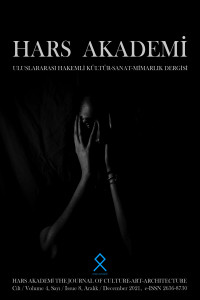Research Article
Year 2021,
Volume: 4 Issue: 8, 621 - 630, 31.12.2021
Abstract
Poet, writer, translator and medical doctor Hilal Karahan’s poems in Forty Patchworks Forty Wounds, convey the voices of women who have no words about their own body, clothes, education, marriage and future; who are exposed to physical and psychological violence; who are raped, and reflect their drama.
Witnessing/partnering the suffering of women from different geographies and cultures, Karahan’s narrative poems in Forty Patchworks Forty Wounds are also documentary, with visuals and news excerpts.
In the poems in which women’s place in society, sexuality, marriage and motherhood are questioned, it is striking that Hilâl Karahan is in favor of feminist sensibility and sisterhood.
It is Hilâl Karahan’s lyrical attitude that feed documentary featured poems in Forty Patchworks Forty Wounds. The transfer of emotion in the poems is riveted with photographs and provides the thematic integrity of the book. It can be said that Karahan’s poetry subjects paint a hopeless and dark picture of life.
In Forty Patchworks Forty Wounds, in the “widow’s lament” section, “death in the aegean sea”, “refugee tent”, “boco haram”, “little, black ...”, “white comb”, “widow”, “widow’s lament”, “curettage”; the poems titled “girls’ feast”, “vaginismus treatment”, “tubal ligation”, “hazelnut workers”, “nuptials in a hazelnut tent”, “incest” in the section of “alaplı poems” prove that women do not have a room of their own/freedom.
References
- Atan, Meltem (2015). “Radikal Feminizm: ‘Kişisel Olan Politiktir’ Söyleminde Aile”. The Journal of Europe-Middle East Social Science Studies. October. Volume: 1. Issue: 2. s. 1-21.
- Boym, Svetlana (2010). “Şairenin Ölümü”. Tırnak İçinde Ölüm-Modern Şairle İlgili Kültürel Mitler, (Çev. Emine Ayhan). İstanbul: Metis Yayınları. s. 249-309.
- Butler, Judith (2014). Cinsiyet Belası-Feminizm ve Kimliğin Altüst Edilmesi, (Çev. Başak Ertü). İstanbul: Metis Yayınları.
- Güneş, Fatime (2017). “Feminist Kuramda Ataerki Tartışmaları Üzerine Eleştirel Bir İnceleme”. Fırat Üniversitesi Sosyal Bilimler Dergisi-The Journal of International Social Sciences. C: 27. S: 2. s. 245-256.
- Karahan, Hilâl (2017). Kırk Yama Kırk Yara. İstanbul: Yasak Meyve Komşu Yayınları.
- Koşar, Emel (2017). “Rakamlara İndirgenen Hayatların Şiiri”. www.yenicikanlar.com.tr. [Erişim: 21.12. 2017].
- Koşar, Emel (2019). “‘Herkes Kalbinin Kafesinde Yaşar, Yarasından Bakar Dünyaya’: Hilâl Karahan Şiiri”. Motif Akademi Halkbilimi Dergisi. C: 12. S: 26. s. 440-448.
- Woolf, Virginia (2012). Kendine Ait Bir Oda, (Çev. İlknur Özdemir). İstanbul: Kırmızı Kedi Yayınları.
Year 2021,
Volume: 4 Issue: 8, 621 - 630, 31.12.2021
Abstract
Şair, yazar, çevirmen ve tıp doktoru Hilâl Karahan’ın Kırk Yama Kırk Yara’daki şiirleri kendi bedeni, kıyafeti, eğitimi, evliliği ve geleceği hakkında söz sahibi olamayan, fiziksel ve psikolojik şiddete maruz kalan, tecavüze uğrayan kadınların sesini taşır ve dramlarını yansıtır.
Farklı coğrafya ve kültürlerden kadınların acılarına tanık/ortak olan Karahan’ın Kırk Yama Kırk Yara’daki anlatımcı şiirleri görseller ve haber alıntılarıyla birlikte belgesel niteliği de taşır.
Kadının toplumdaki yerinin, cinselliğinin, evliliğinin, anneliğinin sorgulandığı şiirlerde Hilâl Karahan’ın feminist duyarlığı ve kız kardeşleşmekten yana olduğu göze çarpar.
Kırk Yama Kırk Yara’daki belgesel yanı öne çıkan anlatımcı şiirleri besleyen Hilâl Karahan’ın lirik tavrıdır. Şiirlerdeki duygu aktarımı fotoğraflarla perçinlenir ve kitabın tematik bütünlüğünü sağlar. Karahan’ın şiir öznelerinin hayata dair umutsuz ve karanlık bir tablo çizdikleri söylenebilir.
Kırk Yama Kırk Yara’nın “dul ağıdı” bölümündeki “ege denizi’nde ölüm”, “mülteci çadırı”, “boko haram”, “küçük, siyah…”, “beyaz tarak”, “dul”, “dul ağıdı”, “tahliye” ve “alaplı şiirleri” bölümündeki “kızlar bayramı”, “vajinismus tedavisi”, “tüp bağlatma”, “fındık işçileri”, “fındık çadırında gerdek”, “ensest” adlı şiirler kadının kendine ait bir odası/özgürlüğü olmadığını kanıtlar.
References
- Atan, Meltem (2015). “Radikal Feminizm: ‘Kişisel Olan Politiktir’ Söyleminde Aile”. The Journal of Europe-Middle East Social Science Studies. October. Volume: 1. Issue: 2. s. 1-21.
- Boym, Svetlana (2010). “Şairenin Ölümü”. Tırnak İçinde Ölüm-Modern Şairle İlgili Kültürel Mitler, (Çev. Emine Ayhan). İstanbul: Metis Yayınları. s. 249-309.
- Butler, Judith (2014). Cinsiyet Belası-Feminizm ve Kimliğin Altüst Edilmesi, (Çev. Başak Ertü). İstanbul: Metis Yayınları.
- Güneş, Fatime (2017). “Feminist Kuramda Ataerki Tartışmaları Üzerine Eleştirel Bir İnceleme”. Fırat Üniversitesi Sosyal Bilimler Dergisi-The Journal of International Social Sciences. C: 27. S: 2. s. 245-256.
- Karahan, Hilâl (2017). Kırk Yama Kırk Yara. İstanbul: Yasak Meyve Komşu Yayınları.
- Koşar, Emel (2017). “Rakamlara İndirgenen Hayatların Şiiri”. www.yenicikanlar.com.tr. [Erişim: 21.12. 2017].
- Koşar, Emel (2019). “‘Herkes Kalbinin Kafesinde Yaşar, Yarasından Bakar Dünyaya’: Hilâl Karahan Şiiri”. Motif Akademi Halkbilimi Dergisi. C: 12. S: 26. s. 440-448.
- Woolf, Virginia (2012). Kendine Ait Bir Oda, (Çev. İlknur Özdemir). İstanbul: Kırmızı Kedi Yayınları.
There are 8 citations in total.
Details
| Primary Language | Turkish |
|---|---|
| Journal Section | Articles |
| Authors | |
| Publication Date | December 31, 2021 |
| Published in Issue | Year 2021 Volume: 4 Issue: 8 |

